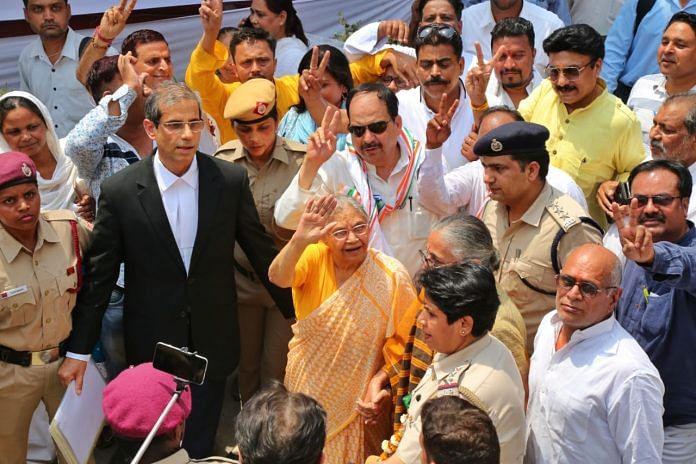New Delhi: In Sheila Dikshit’s demise on Saturday, Delhi’s young voters — those who first voted in 2013 assembly elections — might have lost a chance to redeem themselves in her eyes.
The former Delhi chief minister held their ignorance of her contributions to the national capital responsible for her loss to the Aam Aadmi Party in 2013. In her three interactions with ThePrint since January this year, including an informal one over lunch hosted by former Haryana chief minister Bhupinder Singh Hooda, Dikshit was sure that those young voters, as also older ones, were getting increasingly disillusioned with AAP.
This sentiment would trigger reminiscences about her regime between 1998 and 2013; she said she was now sure both sets of voters would vote for the Congress in the Delhi elections in 2020.
She first made her grouse against young voters public in her autobiography, Citizen Delhi: My Times, My life, released last year. “A considerable chunk of voters, who were casting their ballot for the first time, had not seen the Delhi of 15 years ago. To them, a Delhi with regular power, flyovers and Metro rail, as well as several new universities, was their natural right and therefore taken for granted,” she wrote in her autobiography, as reported by Hindustan Times.
Also read: Sheila Dikshit was a powerful chief minister who knew the importance of having fun
She was sure the Congress was gradually regaining its goodwill and support from the people and that was the reason for her stiff and successful resistance to the proposal for an alliance with AAP in the just-concluded general elections.
Many in her own party thought of her confidence as a flight of fancy of an old, ailing leader who wasn’t ready to give up.
Dikshit certainly loved fantasies. Her favourite book was Alice in Wonderland. She watched the Shahrukh Khan-starrer Dil Wale Dulhania Le Jayenge, or DDLJ, at least a dozen times. Her own political journey was no less fantastic: from a Punjab-born girl to becoming the daughter-in-law of UP Congress stalwart Uma Shankar Dikshit, to contesting her first Lok Sabha election from Kannauj in Uttar Pradesh to enter Parliament, to joining Rajiv Gandhi’s PMO as a junior minister in 1984, and later to become the chief minister of Delhi.
In 2017, the Congress even projected her as its chief ministerial candidate in UP but she was spared the blushes as the party gave up the idea midway and tied up with Akhilesh Yadav’s Samajwadi Party.
Dikshit’s fantasies seemed to give her strength to become the fighter she was. Though she always enjoyed good equations with the Nehru-Gandhi family—her father-in-law was also a minister in Indira Gandhi government— she never had an easy time in Delhi politics. From HKL Bhagat and Jagdish Tytler to Ajay Maken, she always had powerful leaders biding their time in the hope to dislodge her. Even in her last days, she was not afraid to brazen it out with senior Congress leader PC Chacko who was sympathetic with her detractors.
That was who she was. Delhi journalists who covered her government in the good old days would recall her late evening calls as she vented her frustration about the crab-in-the-bucket culture in her party. But she never gave up—not even when her government was hit by a spate of corruption charges linked with the 2010 Commonwealth Games. None of the charges have been proved so far.
In one of the interactions with this correspondent—then reporting for The Indian Express—over breakfast at her home, Dikshit showed an interest in conversations about “rumours about your shift to the Union home ministry”. “I have also heard this, but there’s nothing from Mrs Gandhi,” Dikshit said, with a chuckle.
Truth is, during those days, she was also so frustrated that she even wrote to then Congress president Sonia Gandhi, offering her resignation. The latter sent Congress stalwart Ahmed Patel to her the next day to assure the chief minister of the high command’s support. Dikshit revealed in her autobiography that the December 2012 Delhi gang-rape against Jyoti Singh, or ‘Nibhaya,’ strengthened her resolve to fight it out — both against the opposition and against detractors in her own party.
After she lost the elections in 2013, her equation with the high command began to change. Rahul Gandhi gradually started taking control of the party, although he maintained a strong fondness for her. Sonia Gandhi sought to rehabilitate her in Kerala Raj Bhawan before the 2014 general elections. But Dikshit resigned after the Narendra Modi government swept the polls and began to purge the Raj Bhawans of the beneficiaries of the previous regime.
That was the 29th time that Dikshit shifted her home- from Kerala back to her Nizamuddin house in Delhi. That number signified her readiness for the vicissitudes of life and career and her ability to fight on, no matter the challenge. She was felled by a cardiac arrest today. She would have wanted nothing less.
Also read: Sheila Dikshit, the Delhi aunty and Congress darling, proved politicians never retire




In retrospect, Sheila Dikshit will be remembered as a chief minister who delivered better governance then her predecessors and, most certainly, her successor. Young people do not fully appreciate how she tackled the transportation problems of Delhi since there is much to be done even now. Similarly, she tackled the horrendous power situation by splitting up the transmission companies and privatizing large parts of it. Both of these initiatives have floundered under Arvind Kejriwal. He started by threatening to nationalize the private power companies and offered free power and free water as sops in a city where both are scarce. He has also set the transportation back by not updating the bus fleet and his plan to offer free metro to women is likely to damage it forever. Governance is hard – the contrast between Diskshit and Kejriwal shows how much better she was – the young people don’t appreciate it, yet.